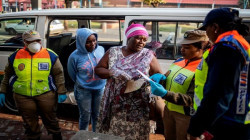Capitals, April. 26 (Saba) - Africa is still the lowest number of cases of the new COV-19 virus compared to the rest of the world, according to estimates based on WHO figures, while countries on the continent do not have health systems capable of dealing with this deadly epidemic.
According to the World Organization, the number of corona cases in Africa as of the beginning of this month is estimated at 7,400, and about 280 deaths.
These figures are low compared to Africa's population of more than 1.25 billion, while the latest statistics on the spread of the corona virus on Sunday showed that the total number of HIV infections exceeded 1.770,000, of which more than 402,000 people worldwide have recovered.
According to Johns Hopkins University, 1,773,353 cases of coronary virus have been confirmed worldwide, 402,270 people have recovered, and another 108,702 have been confirmed to have died from the disease.
However, the number of people infected with CORONA on the African continent is increasing day by day, and to reduce the risk of its spread, many of these countries have closed their borders and suspended flights.
Maghreb countries with Egypt are among the countries most affected by MERS-CoV, according to recent available statistics. South Africa is one of the countries with the highest number of casualties in sub-Saharan Africa.
The risks remain high, if the epidemic reaches the poorest areas of the continent, because many factors, such as miserable living conditions and congestion, may spread at lightning speed, especially since hospitals across the continent are already burdened with measles, malaria and other infectious diseases, not to mention the impact of conflicts that have displaced hundreds of thousands and destroyed infrastructure.
Scientists fear a rise in HIV infections in Africa, particularly with poor health care, the inability of many on the continent to have access to clean water and soap to constantly wash hands, and the spread of lies about the virus, especially on social media.
WHO Director-General Tedros Adhanom Gipresos had previously said that his biggest concern was the spread of Coved-19 in countries with weak health systems.
It is feared that the decrease in the number of cases in Africa may be the result of a lack of screening equipment, which means that the number will be much higher, but not detected.
Many African countries suffer from a shortage of beds and intensive care beds, and may therefore not have the capacity to provide the necessary health care for Corona patients.
The corona virus has spread in some African countries, but it is largely believed that there is another threat facing Africa: the spread of misinformation about ways to prevent MERS-CoV.
Misleading information about the virus has spread on social media sites across the continent, but some African countries have taken strong action to address Corona, and their governments are collaborating with technology giants such as Facebook and WhatsApp to combat misinformation about the virus that may contribute to the increased spread of the disease in a continent suffering from the fragility of health care systems.
South Africa plans to launch a large-scale survey to detect people living with MERS-CoV and to send some 10,000 health workers to screen citizens at home, with the aim of detecting people living with HIV.
In Nigeria, medical officials are collaborating with Facebook-owned messaging service to send user messages with tips and information on symptoms and how to avoid infection.
Governments and technology companies are locked in a battle, with the virus spreading at a time when unfounded rumors are spreading on social media. Among these rumors, which appeared on Twitter and monitored by Reuters, "black people don't get corona," a Kenyan user posted with 700,000 followers.
In another tweet, he tweeted, "If you suspect you are injured. You have to learn how to open the airway by boiling and inhaling lemon and ginger," posted a 119,000-follower from Nigeria.
Some governments are now resorting to punitive measures, for example, Kenya has arrested two men, one of whom is a prominent blogger for spreading misinformation about the virus on Twitter, an indictment punishable by 10 years in prison or a fine of 5 million Kenyan shillings ($48,000), neither of which has been formally charged.
South Africa passed a law in March punishing the dissemination of misleading information about the virus, with up to six months in prison.
Public health officials fear that this misinformation will increase the number of infections on the continent, whose health systems are under severe strain. Many people know from painful experiences how misinformation can spread a deadly epidemic.
Researchers at Harvard University say false claims that garlic, beetroot and lemon roots are an effective alternative to antiviral drugs contributed to the deaths of hundreds of thousands at the height of the AIDS outbreak in the 2000s.
Rumors that foreign health workers are bringing Ebola have disrupted the response to two outbreaks in Africa over the past six years.
Fear and ignorance
As cases of MERS-CoV in Africa increased, similar rumors began to appear heavily on social media that the price of garlic and lemons had tripled within days of the first mers-CoV infection in Ethiopia confirmed, and a ginger seller said, "They are required for therapeutic purposes. I protect myself by putting a clove of garlic in the hole of the nose and ginger in the other."
These recipes, based on false allegations, are well received on a continent where many cannot access clean water and soap to wash hands constantly.
Facebook, Twitter and YouTube have banned users from posting misleading information about Covid-19 on their platforms, but Sivashali Helila, Africa's chief executive at The Meltwater Global Media Intelligence Company, said the volume of posts on Covid-19 is too large to monitor every misinformation.
I.M

| more of (Reports) |




